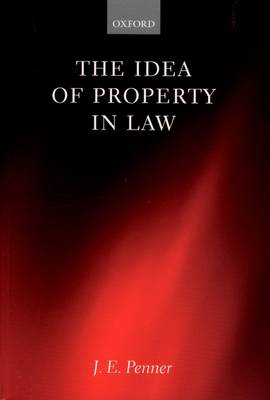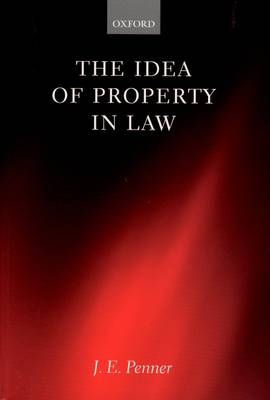
Door een staking bij bpost kan je online bestelling op dit moment iets langer onderweg zijn dan voorzien. Dringend iets nodig? Onze winkels ontvangen jou met open armen!
- Afhalen na 1 uur in een winkel met voorraad
- Gratis thuislevering in België vanaf € 30
- Ruim aanbod met 7 miljoen producten
Door een staking bij bpost kan je online bestelling op dit moment iets langer onderweg zijn dan voorzien. Dringend iets nodig? Onze winkels ontvangen jou met open armen!
- Afhalen na 1 uur in een winkel met voorraad
- Gratis thuislevering in België vanaf € 30
- Ruim aanbod met 7 miljoen producten
Zoeken
Omschrijving
James E. Penner ponders with much insight both the notion of property and its place in the legal system, and his musings prove fascinating. Penner proposes that the idea of property as a bundle of rights--including the right to possess, the right to use, the right to destroy, etc.--is deficient as a concept. That is, it fails to effectively characterize any particular sort of legal relation and evades attempts to determine which rights are crucial to the bundle. By way of a thorough exploration of property rules, property rights, and the interests which property serves and protects, Penner develops an alternative interpretation, and then considers how property functions within the broader legal system.
Specificaties
Betrokkenen
- Auteur(s):
- Uitgeverij:
Inhoud
- Aantal bladzijden:
- 256
- Taal:
- Engels
Eigenschappen
- Productcode (EAN):
- 9780198299264
- Verschijningsdatum:
- 12/10/2000
- Uitvoering:
- Paperback
- Formaat:
- Trade paperback (VS)
- Afmetingen:
- 226 mm x 150 mm
- Gewicht:
- 403 g

Alleen bij Standaard Boekhandel
+ 210 punten op je klantenkaart van Standaard Boekhandel
Beoordelingen
We publiceren alleen reviews die voldoen aan de voorwaarden voor reviews. Bekijk onze voorwaarden voor reviews.











